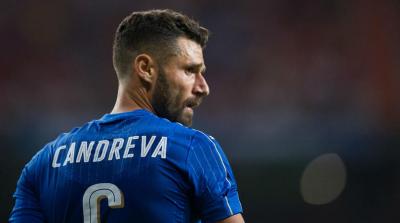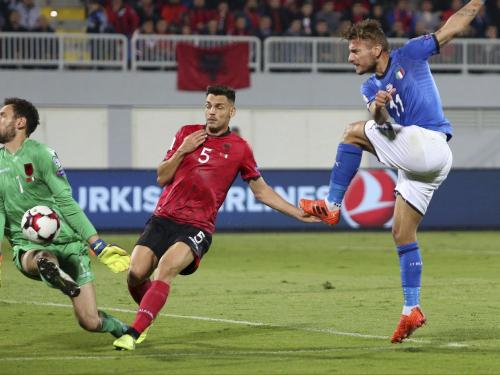Beleaguered Azzurri lack talisman

ROME – After a dismal qualifying campaign, Italy prevailed in a nervy encounter in Albania to book their place in the World Cup playoffs. The Azzurri finished second behind Spain in Group G and will now go into the knockout round as top seeds, despite flattering to deceive in the majority of their qualifiers.
After enduring a painful 1-1 home draw with Macedonia in Group G’s penultimate round of fixtures, travelling Italian fans could have been forgiven for a pessimistic attitude ahead of an exotic final contest, away in Albania. The performance on the night, which will do little to inspire the nation’s confidence, succeeded in summing up the campaign as a whole.
Eventually the Azzurri struggled to a 1-0 victory, with Inter Milan’s Antonio Candreva netting the only goal. Italy will now face a two-legged playoff against one of the other eight highest placed runners-up, to claim one of the golden tickets to the World Cup finals in Russia next summer.
Whilst it was always going to be a challenging task to finish above a rejuvenated Spanish side, the Azzurri ended the campaign a distant five points behind their rivals, after a poor run of fixtures including a 3-0 loss to Spain, slim 1-0 wins over Israel and Albania, and the aforementioned 1-1 draw with Macedonia. This barren period has seen heightened speculation surrounding the future of coach, Gian Piero Ventura, who bemoaned the absence of key players in the aftermath of the victory in Albania.
"We are a bit limited at the moment with a few players out, but we wanted to do things and you could see that certain players are slowly realising we can achieve a lot,” said Ventura. “I hope to have fit players for the playoff matches, otherwise it will be a problem but this win this confirms what I said, “if you want to achieve something, you need to be given the time to do it."
Ventura’s hand has undoubtedly been forced with recent team selections, as high profile absentees include Daniele de Rossi, Andrea Belotti and Marco Verratti. Nevertheless, the Italian side for the trip to Albania featured only three players who could realistically be named as guaranteed starters: veteran goalkeeper Gianluigi Buffon and defenders Giorgio Chiellini and Leonardo Bonucci. The latter has enjoyed a mixed start to life at AC Milan, following a surprise move from champions Juventus during the summer transfer window, but remains a defensive stalwart for the Azzurri.
The Tirana team sheet also included the recognisable names of Lorenzo Insigne and Ciro Immobile but lacked the sort of stardust that has been sprinkled throughout the great Azzurri teams of recent decades. Certainly one of greatest weaknesses affecting this Italy side is the lack of a true attacking talisman, the sort of player who can grab a game by the scruff of the neck and be relied upon to deliver in pressurised encounters.
At this juncture, it seems almost unfair to mention the names of Cristiano Ronaldo and Lionel Messi, but both of these superstars were once again of pivotal importance for their countries, in the latter stages of the qualification campaign.
The Portuguese side knew that they required two wins from the last two games against Andorra and a Switzerland side that had won nine games from nine and were yet to blink. With Portugal struggling to break the deadlock against a resolute Andorra defence in the penultimate match, Ronaldo came off the bench with 20 minutes to go and single handedly dragged his team to a 2-0 victory. Following another 2-0 win against Switzerland, Portugal’s place in Russia was secured and for Ronaldo, a shot at further glory following the European Championships title last season.
Messi’s achievements in Argentina’s final qualifying match were arguably even more impressive. The diminutive forward scored a hat trick against Ecuador in Quito, which is a notoriously difficult venue for visiting sides due to the altitude, to propel Argentina to the World Cup finals. Prior to the game, Messi’s team had been in severe danger of exiting the tournament after a dismal run of form.
These two footballing greats have long acted as respective figureheads for Real Madrid and Barcelona but they are also indispensable for their countries. The Italian crop of 2017 lacks such a player. If one examines the team sheet from the World Cup final in 2006, the Italy starting XI comprised a team including the likes of Fabio Cannavaro, Francesco Totti and the Milanese midfield masters, Gennaro Gattuso and Andrea Pirlo.
If the Italian team of 2006 got into difficulties, the substitutes bench included such names as Pippo Inzaghi and Alessandros Nesta and Del Piero. Currently, the most famous names on the Azzurri bench are Manolo Gabbiadini and Davide Zappacosta and while the duo could be described as solid premier league players, the replacements in 2006 were regular candidates for the Ballon d’Or.
As top seeds heading into the playoffs, Italy should qualify for the World Cup, with head coach Ventura describing the alternative as “unthinkable.” Indeed should the Azzurri crash out during the November playoffs, it would mark the team’s first World Cup missed since 1958.
Nevertheless, should Italy confirm their place at the finals in Russia, it would be a brave person to bet on the team advancing past the group stage of the World Cup finals. Many European and South American teams have been buoyed by positive qualifying campaigns and possess talismanic figures that Italy just does not have. For Brazil there is Neymar Jr, for Uruguay Luis Suarez, for Spain there is Andres Iniesta, Alvaro Morata and David Silva, while Colombia has el Tigre in Radamel Falcao. The list continues.
While this may be painting a somewhat bleak picture for the short-term future of Italian football, it’s important to remember that it could be worse. After a truly disastrous tournament at the 2010 World Cup in South Africa, politicians and the public in France were outraged at the attitude and performance of the country’s stars.
“I told the players that they had tarnished the image of France,” said the then Minister for Sport, Roselyne Bachelot. “It is a disaster for French football. I told them they could no longer be heroes for our children. They have destroyed the dreams of their countrymen, their friends and their supporters.”
Fast forward seven years and France have blitzed qualification to go into next year’s World Cup finals as one of the hottest properties in world football. Their team includes more superstars than one would care to mention: Paul Pogba, Antoine Griezmann and Kylian Mbappé to name but a few. The country dares to dream once more.
From an Italian perspective, if the team prospers in the November playoffs, there will be little to lose in Russia. The tournament will mark a changing of the guard as Gianluigi Buffon finally hangs up his gloves and his captain’s armband for a well-deserved retirement. It is hoped that the country’s younger stars led by the AC Milan wonderkid goalkeeper, Gianluigi Donnarumma, will be ready to take up the mantle.
The World Cup undoubtedly needs a great Italy side, but it may have to wait four years.



